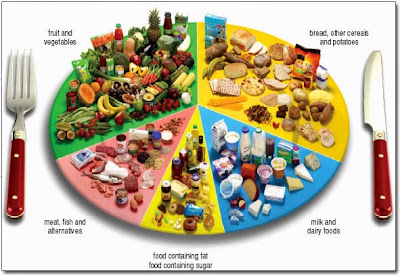The Recommended Daily Intake (RDI)
The RDI is the daily intake level of a nutrient that is considered to be sufficient to meet the requirements of 97–98% of healthy individuals.
Based on a 2000 Calorie Intake; for Adults and Children (4 or More Years of Age):
| Nutrient | Unit of Measure | Daily Values |
|---|---|---|
| Total Fat | grams (g) | 65 |
| Saturated fatty acids | grams (g) | 20 |
| Cholesterol | milligrams (mg) | 300 |
| Sodium | milligrams (mg) | 2400 |
| Potassium | milligrams (mg) | 3500 |
| Total carbohydrate | grams (g) | 300 |
| Fiber | grams (g) | 25 |
| Protein | grams (g) | 50 |
| Nutrient | Unit of Measure | Daily Values |
|---|---|---|
| Vitamin A | International Unit (IU) | 5000 |
| Vitamin C | milligrams (mg) | 60 |
| Calcium | milligrams (mg) | 1000 |
| Iron | milligrams (mg) | 18 |
| Vitamin D | International Unit (IU) | 400 |
| Vitamin E | International Unit (IU) | 30 |
| Vitamin K | micrograms (µg) | 80 |
| Thiamin (B1) | milligrams (mg) | 1.5 |
| Riboflavin (B2) | milligrams (mg) | 1.7 |
| Niacin (B3) | milligrams (mg) | 20 |
| Pyridoxine (B6) | milligrams (mg) | 2.0 |
| Folate (B9) | micrograms (µg) | 400 |
| Cobalamin (B12) | micrograms (µg) | 6.0 |
| Biotin (B7) | micrograms (µg) | 300 |
| Pantothenic acid (B5) | milligrams (mg) | 10 |
| Phosphorus | milligrams (mg) | 1000 |
| Iodine | micrograms (µg) | 150 |
| Magnesium | milligrams (mg) | 400 |
| Zinc | milligrams (mg) | 15 |
| Selenium | micrograms (µg) | 70 |
| Copper | milligrams (mg) | 2.0 |
| Manganese | milligrams (mg) | 2.0 |
| Chromium | micrograms (µg) | 120 |
| Molybdenum | micrograms (µg) | 75 |
| Chloride | milligrams (mg) | 3400 |
Source: www.netrition.com
Recommended Daily Intake of Omega-3
The amount of omega-3 your body needs to reduce the risk of chronic disease has not been fully determined. That is why a recommended daily allowance, or RDA, has not yet been established for omega-3. However, scientists have enough evidence to establish an adequate intake amount of alpha-linolenic acid, which is a member of the omega-3 family. The amount of alpha-linolenic acid your body needs is represented as the Adequate Intake (AI) level, which is a tentative RDA. Both RDA and AI represent the ideal amount of essential nutrients you need to live a healthy life.
Alpha-Linolenic Acid
The members of the omega-3 fatty acid family are alpha-linolenic acid, eicosapentaenoic acid (EPA) and docosahexaenoic acid (DHA). Alpha-linolenic is the only essential nutrient in this family. Essential means you must get proper amounts of this nutrient from your diet. Your body cannot produce it. Alpha-linolenic acid is needed for your cell membranes, your brain and vision. It works together with other biological compounds that promote heart health. Omega-3 fatty acids are heart-healthy fats.
Amount for Children
Children ages 1 through 3 require 0.7 g of alpha-linolenic acid in their daily diet, and kids 4 through 8 need 0.9 g daily. Walnuts, walnut oil, flaxseed, flaxseed oil, canola oil, and soybeans, soybean oil and pumpkin seeds are the only food sources of alpha-linolenic acid. Grind up 1 tbsp. of flaxseed in a coffee grinder and mix it in hot cereal or yogurt. That will give your kids about 2.2 g of alpha-linoleni acid. Add flaxseed meal to pancake or waffle batter. Use canola oil for baking or cooking -- 1 tbsp. provides 1.3 g of alpha-linolenic acid.
Amount for Adolescents
Girls 9 through 13 require 1.0 g of alpha-linolenic acid; boys the same age need 1.2 g. Teenage girls 14 through 18 require 1.1 g of alpha-linolenic acid; their male counterparts need 1.6 g. Adolescents can be finicky about what they eat. Add ground flaxseed to their yogurt or cereal. Encourage them to try dry roasted soybeans. Choose trail mix that includes dry roasted walnuts or soybeans. Add finely chopped walnuts to home-made cookie dough recipes. Use canola oil for baking and cooking.
Amount for Adults
Adult men and women 19 and over need 1.6 g and 1.1 g, respectively, of alpha-linolenic acid. One tbsp.of flaxseed has 2.2 g; canola oil, 1.3 g; English walnuts, about 0.7 g. One tbsp. of flaxseed oil provides 8.5 g of alpha-linolenic acid. Use canola oil for cooking and baking instead of butter. Add flaxseed oil to smoothies.
Source: http://www.livestrong.com/article/386174-recommended-daily-intake-of-omega-3/


No comments:
Post a Comment